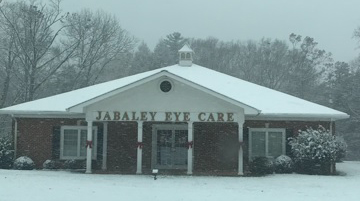By Jennifer Jabaley, OD

Feb. 7, 2018
It’s that time of year for much of the country when bad weather can become the norm. Does your office have a game plan for braving winter storms? Create a protocol, so your staff knows what to do when the roads become treacherous, and patients need to be alerted of cancellations or delays of their appointments.
In December, there was a change in the forecast, and with less than a day’s warning, we got 10 inches of snow. In Georgia. The new year brought Charleston, S.C., a historic snowfall, dropping over eight inches at the airport, the third-largest accumulation ever recorded for that area. And the northeast was bombarded with a “bomb cyclone,” an intimidatingly named winter storm that ushered in snow, ice and hazardous winds. While my kids sit excitedly waiting for a cancelled-school announcement, for optometrists with offices to run and patients to see, inclement weather more often leaves us with a sense of dread.
In our practice, there was a loss of income on the day we closed the office due to snow. We pay our salaried employees when our office is closed unexpectedly, however those employees, who are hourly or part time, were not paid. The biggest challenge for us is trying to get patients rescheduled, since we are booked out over a month. The way we handled the situation was this: Since I only see patients part time, (while my husband sees patients full time) the following two weeks I came in an additional half-day, and slid all the snow-day patients into those appointments.
We moved our runner tech (the employee who picks patients up from the exam room and brings them to the dispensary) to a pre-test position for those days, so we had two available pre-testers working up to different doctor’s schedules, and we moved our recall/administrator over to the dispensary to help out with the extra volume of patients. The take home point is to recognize how critical it is to have your staff cross-trained to fill in as needed. Also, even though we’ve designed our practice as a one-doctor practice, we fortunately planned for growth, and have the extra exam rooms and staff needed to allow both my husband and me to see patients at the same time when necessary.
A cross-trained, flexible staff is especially important when the office is forced to close due to bad weather. It’s also essential that you discuss with employees protocol for when the office needs to close, or you risk generating anger and frustration. “Inclement weather is one of those issues that engenders strong feelings,” Eric Athey, the co-chair of Labor and Employment Group in Lancaster, Penn., said in an article on Inc.com. “If the employee is expected to come in when things are dangerous, that could sour the relationship. Likewise, if he feels like he should be paid in particular circumstances, and he’s not, that could give rise to a bad attitude.”
The best way to avoid employee disappointment or confusion is to have an inclement weather policy, however, according to a survey of small business owners by Travelers Insurance in 2011, nearly 44 percent of small business owners did not have a written business plan or document on hand that clearly explained procedures to implement in the event of weather emergencies.
It is not smart to have an office that operates with this level of ambiguity. In creating a policy for your business, here are some things to keep in mind.

Dr. Jabaley’s practice in Georgia in a snow storm during the holiday season. This was a rare weather occurrence that led Dr. Jabaley to think carefully about how her practice approaches treacherous weather.
Stay Informed
First and foremost, the only way to make educated decisions is to keep updated on weather forecasts and road conditions in your area. Consider downloading weather apps and alerts onto your phone that will alert you to threatening conditions in your area. Click HERE for information about signing up for alerts from the National Weather Service.
Plan for Effective Communication with Your Staff
Your documented weather policy should state who is responsible for notifying the staff when the office will be closed or delayed in opening. Plan ahead before an emergency on the best method of notification with your staff. Poll your employees about the communication mode that works best for them: a phone call, a text message or an e-mail. Make sure preferred phone numbers are documented. Have a back-up method of communication in the event that phone lines or internet services are down due to the weather.
Plan for Effective Communication with Your Patients
A phone call to the patients who have appointments scheduled for the day the office will be closed should be made in as timely a matter as possible. Additionally, it is crucial that an out-going message is recorded for your office number that clearly states that the office will be closed due to inclement weather. Your practice web site and social media sites such as Facebook, Instagram, and other web sites where you have a presence, should all list that the office will be closed. Finally, a sign can be hung on the front door.
Call in Reinforcements
When the 10 inches of snow hit our area, it was unexpected, The Weather Channel only mentioning snow a few hours before the sky opened up. We didn’t have time to pre-plan and call to cancel patients. That morning, my husband and I drove very early to the office to make proper arrangements and place the phone calls to patients. Luckily, we live two miles from the office, and were able to drive there without risk. Still, with just the two of us, it took almost an hour by the time we were able to contact everyone on that day’s schedule.
Make a note if you have any employees who could make it in without risking injury or accidents to help you when weather hits quickly or unexpectedly. Barbara Goldberg, a small business productivity expert from Back on Track Solutions, recommends asking which employees could possibly still come in during bad weather. “Know which employees live closest to the business, and offer them incentives, such as extra pay or future time off if they would be willing to come in and work during bad weather,” she says.
Clearly State Employee Pay Policy for Days off Due to Inclement Weather
If you decide the office will close due to inclement weather, the most common question becomes: Do you need to pay your employees? Generally, under federal law, an employer can implement its own policy for non-exempt employees, according to Athey at the Labor and Employment Group in Pennsylvania (Inc.com). But for exempt employees, there are generally two rules which can vary according to state laws. The first says if the employee works any part of the day, but the office closes early for inclement weather, that employee earns a full day’s pay. The second rule states that if the employer chooses to close the office, the employee must be paid.
Editor’s Note: It’s best to consult your state’s laws before establishing payroll policy for days the office must close unexpectedly.
Of course, you can make your own policies regarding payment on days of inclement weather, especially for non-exempt employees. According to a Connecticut Business Industry Association survey, the most common practice when bad weather forces a closing is “to pay hourly employees only for the hours actually worked.” (Inc.com)
Plan for Parking Lot and Walkway Clean Up
Snow and ice can present a huge risk for injury. Make sure your parking lot, driveway and walkways are clear, so employees and patients can get from their car to your office without incident. This is particularly important if you have an elderly patient demographic–elderly people have a more difficult time navigating icy and snowy spots. Even if you don’t often get snow, surprises happen. Make sure you have a plan in place.
Budget Ahead
If you need to close your office for inclement weather, your finances will take a hit. Prepare with an emergency fund to cover these expenses, so you don’t feel the burden of financial loss.
Inclement weather, and other emergencies, can affect your office’s ability to open for business. The safety of our employees and patients is paramount, so plan ahead for these types of emergencies by formulating an inclement weather policy for your practice.
Does your office have a protocol in place for when treacherous weather hits? How do you let your employees and patients know when your office will be closed? What is your policy on paying employees when the office must be closed?
 Jennifer Jabaley, OD, is a partner with Jabaley Eye Care in Blue Ridge, Ga. To contact her: jabaleyjennifer@yahoo.com
Jennifer Jabaley, OD, is a partner with Jabaley Eye Care in Blue Ridge, Ga. To contact her: jabaleyjennifer@yahoo.com



























